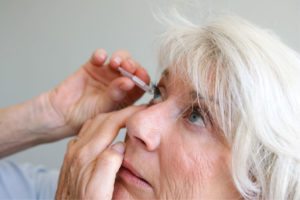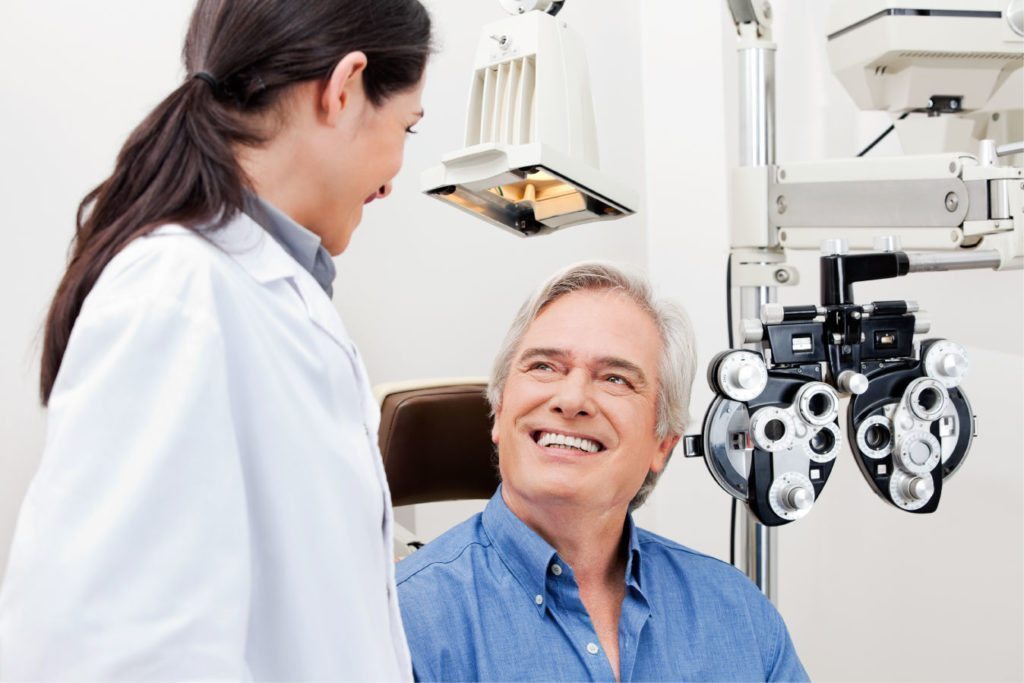Glaucoma is the leading cause of irreversible blindness worldwide. One in eight Australians over 80 will develop glaucoma. First-degree relatives of glaucoma patients have a ten-fold increased risk of developing the disease.
Now what exactly is glaucoma?
Glaucoma is a group of eye diseases where the optic nerve at the back of the eye is slowly destroyed over time. It can be caused by different reasons such as an increase in eye pressure, poor blood flow to optic nerve fibers or a weakness in the structures of the optic nerves. Vision loss usually starts peripherally, and many patients are unaware of these changes initially. In fact, 50% of Australians with glaucoma are undiagnosed. In advanced stages, you can lose all your vision and become blind.
Every year people around the world develop glaucoma, and each day without treatment brings them a step closer to blindness.

How a person with vision loss from glaucoma views the world
Risk factors for glaucoma:
- Age – moderate risk for people over 50 years of age, with high risk for those over 80 years of age
- Family History – the prevalence is three to six times that of general population if any close relatives have glaucoma
- Diabetes – there is almost twice the risk of glaucoma onset among individuals with diabetes
- Myopia (Shortsightedness) – multiple studies have concluded, adjusted for age, that myopes are 2 to 5 times more likely to get glaucoma than those who were not myopic
- Hyperopia (Farsightedness) – Hyperopes have higher risk for angle-closure glaucoma
- Thin Cornea – a central corneal thickness of less than 0.5 millimeters, as measured by an optometrist
- Smoking – Current smoking results in a significant increased risk, however past smoking does not affect this risk
- Long-Term Steroid Use
- Migraine
- Eye Injury
- Systemic Blood Pressure
If you have 2 or more of these risk factors, please see an optometrist sooner than later!

Here are some questions about glaucoma as answered by Dr Chen:
Q. Why is eye pressure important?
Dr Chen: Eye pressure is important because higher pressures in the eye is one of the risk factors for glaucoma. Too much pressure causes damage to the optic nerve inside the eye and can cause you to lose vision.
Q. If I have high eye pressures, does it mean that I have glaucoma?
Dr Chen: No. You can actually have high pressures and not have glaucoma, and interestingly you can have low pressures and have glaucoma. The reason why is glaucoma is a progressive loss of nerve fibers in the optic nerve, and this can happen from different reasons. High pressure is only one of the possible causes.
Q. So what other tests do u need to do to diagnose glaucoma then?
Dr Chen: We need to look inside the eye to assess the optic nerve, often we use eyedrops to dilate your pupils to do that. We also do imaging of the back of the eye—a retinal imaging called OCT scan—which scans through the different layers inside the eye, kind of like what an MRI scan does for the brain. A visual field test is also done which can show if you have any loss of peripheral vision from glaucoma.
Q. How do you treat glaucoma?
Dr Chen: Glaucoma treatment only stops your vision from getting worse. Once there is vision loss, it is irreversible, therefore it is extremely important to diagnose it early. The first line of treatment is usually to use eyedrops, which lowers the pressure, and this prevents further damage. There are also surgical options available.

Q. How do I know if I need to do extra tests for glaucoma?
Dr Chen: Those with family history of glaucoma should all test for glaucoma, especially if they are over the age of 40. Also certain health conditions can increase your risk of getting glaucoma for example diabetes, migraines, sleep apnoea. During your general eye test, the optometrist may also pick up other risk factors like high eye pressures, thin corneas and evidence of thinning optic nerve which may indicate further testing is needed.
Q. If I don’t treat glaucoma, what will happen to me?
Dr Chen: Glaucoma usually starts by losing peripheral vision so you end up with tunnel vision, but in very advanced stages, you could lose all vision and become blind.
Q. I have already been diagnosed with glaucoma. How can I ensure that it won’t get worse?
Dr Chen: The most important thing is stick to your advised treatment plan, for example, not forgetting to put in your eyedrops. It’s also very important to return for your followup appointments with your eye specialist or optometrist so that they can monitor and adjust your treatment plan if needed.
Q. When do glaucoma patients need to see an eye specialist?
Dr Chen: If we suspect that patients have glaucoma, we usually send them to the eye specialist to confirm diagnosis. Sometimes we co-manage with the eye specialist, which means in between seeing them you can see us to do tests needed. Most of the optometrists here can prescribe the eye drops for glaucoma if you need to renew your script.
Q. What else would you like your patients to know regarding glaucoma and its detection?

Dr Chen: Early diagnosis is very important to catch glaucoma in its earliest stages, so it is good to have regular eye exams. Our Eyecare Plus practices providing Eyecare Vision services offer you a comprehensive testing for glaucoma and other eye diseases as we have all the new technology here, including the OCT scan. OCT scan allows us to detect glaucoma early and is also useful to monitor for any small changes over time.
To learn more about glaucoma, go here.
The best time to detect glaucoma is at its earliest stage.
